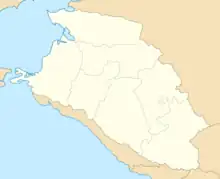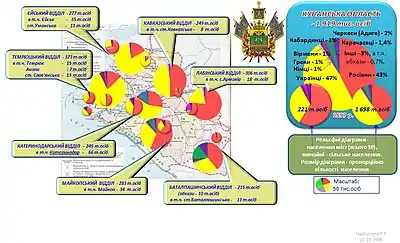Kuban oblast
The Kuban oblast[lower-alpha 1] was a province (oblast) of the Caucasus Viceroyalty of the Russian Empire. It roughly corresponded to most of the Kuban and Circassia regions. It was created in 1860 out of Kuban Cossack territories that had once been part of the Crimean Khanate and the land of the Circassians. It was dissolved upon the assumption of supreme authority by the Kuban Rada in 1917 and the independence of the Kuban People's Republic in 1918. Its capital was the city of Yekaterinodar (present-day Krasnodar).[1]
Kuban oblast
Кубанская область | |
|---|---|
 Coat of arms | |
 Administrative map of the Kuban Oblast | |
| Country | Russian Empire |
| Viceroyalty | Caucasus |
| Established | 1860 |
| Abolished | 1917 |
| Capital | Yekaterinodar (present-day Krasnodar) |
| Area | |
| • Total | 94,783.07 km2 (36,595.95 sq mi) |
| Highest elevation | 5,642 m (18,510 ft) |
| Population (1916) | |
| • Total | 3,022,683 |
| • Density | 32/km2 (83/sq mi) |
| • Urban | 9.52% |
| • Rural | 90.48% |
Administrative divisions
The Cossack districts (otdels) of the Kuban oblast in 1917 were as follows:[2][3]
| Name | Capital | Population | Area | |
|---|---|---|---|---|
| 1897 | 1916 | |||
| Batalpashinsky otdel (Баталпашинскій отдѣлъ) | Batalpashinskaya (Cherkessk) | 215,400 | 298,208 | 15,328.05 square versts (17,444.27 km2; 6,735.27 sq mi) |
| Yeysky otdel (Ейскій отдѣлъ) | Umanskaya (Leningradskaya) | 277,300 | 384,846 | 12,127.84 square versts (13,802.24 km2; 5,329.07 sq mi) |
| Yekaterinodarsky otdel (Екатеринодарскій отдѣлъ) | Yekaterinodar (Krasnodar) | 245,173 | 371,788 | 7,357.78 square versts (8,373.61 km2; 3,233.07 sq mi) |
| Kavkazsky otdel (Кавказскій отдѣлъ) | Kavkazskaya | 249,182 | 462,235 | 13,941.40 square versts (15,866.18 km2; 6,125.97 sq mi) |
| Labinsky otdel (Лабинскій отдѣлъ) | Armavir | 305,733 | 518,774 | 5,919.94 square versts (6,737.26 km2; 2,601.27 sq mi) |
| Maykopsky otdel (Майкопскій отдѣлъ) | Maykop | 283,117 | 468,453 | 14,435.76 square versts (16,428.79 km2; 6,343.19 sq mi) |
| Tamansky otdel (Таманскій отдѣлъ) | Slavyanskaya (Slavyansk-na-Kubani) | 342,976 | 518,379 | 14,173.84 square versts (16,130.71 km2; 6,228.10 sq mi) |
Structure
The militarized nature of the Kuban meant that, rather than a traditional governorate (guberniya) with counties (uezds), the territory was administered by the Kuban Cossacks as an oblast which was split into otdels. Each otdel had its own sotnias which in turn would be split into stanitsas and khutors. The ataman ("commander") for each region was not only responsible for the military preparation of the Cossacks, but for the local administration duties. Local stanitsa and khutor atamans were elected, but approved by the atamans of the otdel. These, in turn, were appointed by the supreme ataman of the Kuban host, who was in turn appointed directly by the Russian emperor. Prior to 1870, this system of legislature in the oblast remained a robust military one and all legal decisions were carried out by the stanitsa ataman and two elected judges. Afterwards, however, the system was bureaucratized and the judicial functions were independent of the stanitsas.
Demographics

Russian Empire Census
According to the Russian Empire Census, the Kuban oblast had a population of 1,918,881 on 28 January [O.S. 15 January] 1897, including 973,023 men and 945,858 women. The plurality of the population indicated Ukrainian to be their mother tongue, with a significant Russian speaking minority.[2]
| Language | Native speakers | % |
|---|---|---|
| Ukrainian | 908,818 | 47.36 |
| Russian | 816,734 | 42.56 |
| Circassian | 38,488 | 2.01 |
| Karachay | 26,877 | 1.40 |
| German | 20,778 | 1.08 |
| Greek | 20,137 | 1.05 |
| Kabardian | 14,340 | 0.75 |
| Armenian | 13,926 | 0.73 |
| Abkhaz | 12,481 | 0.65 |
| Belarusian | 12,356 | 0.64 |
| Nogai | 5,880 | 0.31 |
| Romanian | 5,370 | 0.28 |
| Tatar[lower-alpha 2] | 3,848 | 0.20 |
| Polish | 2,719 | 0.14 |
| Turkish | 2,187 | 0.11 |
| Ossetian | 1,973 | 0.10 |
| Jewish | 1,942 | 0.10 |
| Romani | 1,753 | 0.09 |
| Mordovian | 1,494 | 0.08 |
| Czech | 1,213 | 0.06 |
| Georgian | 917 | 0.05 |
| Estonian | 880 | 0.05 |
| Latvian | 848 | 0.04 |
| Kyurin | 615 | 0.03 |
| Kalmyk | 378 | 0.02 |
| Bulgarian | 322 | 0.02 |
| Persian | 252 | 0.01 |
| Lithuanian | 238 | 0.01 |
| Kumyk | 205 | 0.01 |
| Kazi-Kumukh | 175 | 0.01 |
| Bashkir | 138 | 0.01 |
| Avar-Andean | 127 | 0.01 |
| Other | 472 | 0.02 |
| TOTAL | 1,918,881 | 100.00 |
| Faith | Male | Female | Both | |
|---|---|---|---|---|
| Number | % | |||
| Eastern Orthodox | 884,028 | 863,291 | 1,747,319 | 91.06 |
| Muslim | 53,199 | 49,721 | 102,920 | 5.36 |
| Old Believer | 12,363 | 12,580 | 24,943 | 1.30 |
| Lutheran | 8,559 | 8,182 | 16,741 | 0.87 |
| Armenian Apostolic | 7,997 | 6,653 | 14,650 | 0.76 |
| Roman Catholic | 4,413 | 3,121 | 7,534 | 0.39 |
| Judaism | 1,084 | 1,021 | 2,105 | 0.11 |
| Mennonite | 567 | 580 | 1,147 | 0.06 |
| Reformed | 425 | 409 | 834 | 0.04 |
| Buddhist | 194 | 161 | 355 | 0.02 |
| Armenian Catholic | 104 | 39 | 143 | 0.01 |
| Karaite | 42 | 49 | 91 | 0.00 |
| Baptist | 33 | 43 | 76 | 0.00 |
| Other Christian denomination | 10 | 4 | 14 | 0.00 |
| Other non-Christian denomination | 5 | 4 | 9 | 0.00 |
| TOTAL | 973,023 | 945,858 | 1,918,881 | 100.00 |
Kavkazskiy kalendar
.jpg.webp)
According to the 1917 publication of Kavkazskiy kalendar, the Kuban oblast had a population of 3,022,683 on 14 January [O.S. 1 January] 1916, including 1,523,057 men and 1,499,626 women, 1,870,280 of whom were the permanent population, and 1,152,403 were temporary residents.[3]
| Nationality | Urban | Rural | TOTAL | |||
|---|---|---|---|---|---|---|
| Number | % | Number | % | Number | % | |
| Russians | 257,675 | 89.50 | 2,561,356 | 93.66 | 2,819,031 | 93.26 |
| North Caucasians | 674 | 0.23 | 132,997 | 4.86 | 133,671 | 4.42 |
| Other Europeans | 10,098 | 3.51 | 20,667 | 0.76 | 30,765 | 1.02 |
| Armenians | 15,557 | 5.40 | 9,014 | 0.33 | 24,571 | 0.81 |
| Sunni Muslims[lower-alpha 3] | 1,144 | 0.40 | 5,292 | 0.19 | 6,436 | 0.21 |
| Asiatic Christians | 390 | 0.14 | 3,270 | 0.12 | 3,660 | 0.12 |
| Jews | 1,180 | 0.41 | 1,173 | 0.04 | 2,353 | 0.08 |
| Georgians | 766 | 0.27 | 230 | 0.01 | 996 | 0.03 |
| Shia Muslims[lower-alpha 4] | 94 | 0.03 | 720 | 0.03 | 814 | 0.03 |
| Roma | 278 | 0.10 | 63 | 0.00 | 341 | 0.01 |
| Kurds | 45 | 0.02 | 0 | 0.00 | 45 | 0.00 |
| TOTAL | 287,901 | 100.00 | 2,734,782 | 100.00 | 3,022,683 | 100.00 |
Notes
- Before 1918, Azerbaijanis were generally known as "Tatars". This term, employed by the Russians, referred to Turkic-speaking Muslims of the South Caucasus. After 1918, with the establishment of the Azerbaijan Democratic Republic and "especially during the Soviet era", the Tatar group identified itself as "Azerbaijani".[4][5]
- Primarily Turco-Tatars.[7]
- Primarily Tatars.[7]
References
- Tsutsiev 2014.
- "Демоскоп Weekly - Приложение. Справочник статистических показателей".
- Кавказский календарь на 1917 год, pp. 222–229.
- Bournoutian 2018, p. 35 (note 25).
- Tsutsiev 2014, p. 50.
- "Демоскоп Weekly - Приложение. Справочник статистических показателей". www.demoscope.ru. Retrieved 2022-06-30.
- Hovannisian 1971, p. 67.
Bibliography
- Bournoutian, George A. (2018). Armenia and Imperial Decline: The Yerevan Province, 1900–1914. Milton Park, Abingdon, Oxon: Routledge. ISBN 978-1-351-06260-2. OCLC 1037283914.
- Hovannisian, Richard G. (1971). The Republic of Armenia: The First Year, 1918–1919. Vol. 1. Berkeley: University of California Press. ISBN 978-0520019843.
- Кавказский календарь на 1913 год [Caucasian calendar for 1913] (in Russian) (68th ed.). Tiflis: Tipografiya kantselyarii Ye.I.V. na Kavkaze, kazenny dom. 1913. Archived from the original on 19 April 2022.
- Кавказский календарь на 1917 год [Caucasian calendar for 1917] (in Russian) (72nd ed.). Tiflis: Tipografiya kantselyarii Ye.I.V. na Kavkaze, kazenny dom. 1917. Archived from the original on 4 November 2021.
- Tsutsiev, Arthur (2014). Atlas of the Ethno-Political History of the Caucasus (PDF). Translated by Nora Seligman Favorov. New Haven: Yale University Press. ISBN 9780300153088. Archived (PDF) from the original on 17 June 2023.